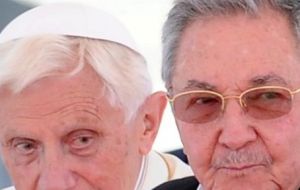MercoPress. South Atlantic News Agency
The Pope next to Castro calls for a future of “freedom and reconciliation” in Cuba
 Benedict addresses the mass next to Raul Castro and urged Cubans to build a renewed and open society
Benedict addresses the mass next to Raul Castro and urged Cubans to build a renewed and open society Pope Benedict urged Cubans to build a better, “renewed and open society” on Monday and pressed the Castro brothers regime to give the Catholic Church more liberties to help the country as it faced an uncertain future.
Arriving from Mexico to start his first trip to Cuba, the Pope also called for a future of “freedom and reconciliation” in Cuba.
Benedict celebrated an open-air Mass for tens of thousands of people Revolution Square ringed by palm trees in this eastern city, and he delivered a strong, clear message in his sermon as President Raul Castro listened from the front row.
“I appeal to you to reinvigorate your faith, that you live in Christ and for Christ, and armed with peace, forgiveness and understanding, that you may strive to build a renewed and open society, a better society, one more worthy of humanity, and which better reflects the goodness of God,” he said.
Just three days after saying that communism no longer works in Cuba, the 84-year-old German pope took a somewhat softer stance as he began a three-day trip aimed at boosting the Church's role on the island.
Arriving in the city of Santiago de Cuba, he delivered a carefully worded, nuanced and balanced speech that was less direct in criticizing Cuba's one-party system but included some thinly-veiled phrases addressing its human rights record.
“I carry in my heart the just aspirations and legitimate desires of all Cubans, wherever they may be,” he said, including the “sufferings” of prisoners and their families, a reference likely to be well received by political dissidents on the island as well as Cuban American exiles in the United States.
He also asked the Virgin of Charity of El Cobre, Cuba's patron “to guide the future of this beloved nation in the ways of justice, peace, freedom and reconciliation”.
Decades of hostility followed Cuba's 1959 revolution but Church-state relations have improved steadily in recent years, helped by Pope John Paul II landmark visit in 1998.
Benedict called that trip “a gentle breath of fresh air” but said that while great strides had been made, “many areas remain in which greater progress can and ought to be made, especially as regards the indispensable public contribution that religion is called to make in the life of society”.
Raul Castro at his turn delivered a firm political lecture about the injustices of US hostility toward Cuba, including the 50-year-old economic embargo, and the island's “tenacious resistance” to preserve its independence and “follow its own path”.
Castro has steadily improved relations with the Church using it as an interlocutor on issues such as political prisoners and dissidents, while moving forward with reforms to Cuba's struggling Soviet-style economy.
They include slashing a million government jobs and freeing up some sectors to small-scale private enterprise. The Church has urged Castro to move farther and faster to modernize Cuba, both economically and politically.




Top Comments
Disclaimer & comment rulesCommenting for this story is now closed.
If you have a Facebook account, become a fan and comment on our Facebook Page!